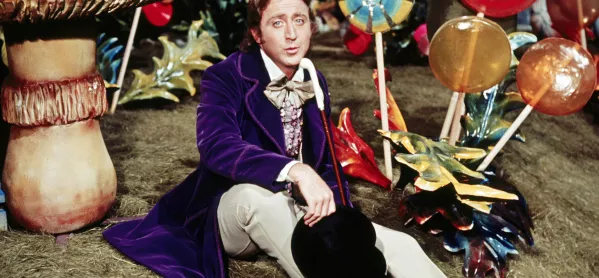- Home
- Roald Dahl Day: The life lessons Willy Wonka teaches us
Roald Dahl Day: The life lessons Willy Wonka teaches us

For me, Charlie and the Chocolate Factory is more than a book: it is a story of hope, inspiration, aspiration, a journey of social mobility - and one of justice, too.
So for this Roald Dahl Day, let me tell you why I think it’s a story that remains as relevant as ever and what it can teach us about education and its role in all children’s lives.
Resilience and hope
Charlie Bucket has all his potential yet to be fulfilled.
His determination not to give up and take every opportunity that comes his way as a step towards betterment is a skill in itself: resilience.
Despite the challenges of low income, unemployment and near starvation, the family pull together in the hope of a better future.
I take this as a never-give-up approach and extend this with the dignity shown in Dahl’s screenplay, which focuses more on Charlie’s act of mindfulness of spending for others rather than himself - buying bread for the family rather than for himself is an act of generosity that should be acknowledged as very commendable.
Both resilience and generosity are skills much needed in the students of today and the future.
Golden opportunity
If ever education was to be defined as the perfect opportunity for self-improvement, social mobility and positive lifechanging outcomes for households, I would compare this to the Golden Ticket.
Finding the Golden Ticket is akin to finding the opportunity to be successful in school. Now, I am aware that cynics may argue that it is a rather oversimplified view of education. Notwithstanding that and the fact that a ‘successful education’ can be defined in so many ways, if I were to narrow it down to having a successful set of qualifications and the determination to work hard underpinned with honesty, I would say this is an opportunity that should be afforded to all.
Yet in the film adaptation Willy Wonka and the Chocolate Factory, where Charlie finds himself in the most awful social stigma, where his classmates who have bought so many more chocolate bars appear to be more affluent, the protagonist shows yet another quality: courage.
He has the honesty to say he has only bought two bars and does not want to follow the crowd in this new “chocolatemania”.
Career development
In the context that some educators find it difficult to argue that we ought to promote competition over collaboration, Charlie finds himself competing against four other children.
Each of the Golden Ticket holders is invited to participate in what is essentially an assessment-centre scenario.
When others are presented with this opportunity, how do they use this chance? Is it down to personal choices or does upbringing or social circumstances also affect the youngsters?
This could quite easily represent a scenario for the university application interview day or even the first job interview. The personalities depicted are very much a warning on how individual traits can hinder progress:
- Charlie Bucket: resilient and generous, but perhaps easily overlooked
- Veruca Salt: Privileged but condescending
- Violet Beauregarde: Sporty but self-promoting
- Mike Teevee: Confident but a know-it-all who refuses to listen to others
- Augustus Gloop: Entitled, lazy and inconsiderate.
These are traits we see time and again across society. Dahl’s message was not one that has dated to his era but that remains pertinent - perhaps even more so - in our current societies.
Ethical and moral dilemmas
Despite Dahl not being wholly satisfied with his screenplay adaptation, the addition of the corporate espionage is also yet another life lesson for us all.
The temptation to cheat for success or betray someone’s trust for self-gain are dilemmas and challenges adolescents and adults alike face on an almost daily basis.
These days making informed decisions and doing the right thing is almost against the mainstream where scandals, sleaze and lies draped in hypocrisy are so often tolerated and even condoned as errors of judgement.
Yet Charlie refuses to be tempted and is rewarded greatly as a result. You can even see parallels in Charlie’s conduct with Nolan’s Seven Standards of Public Life.
After all, why can’t these standards be applied to all stakeholders in schools and society including the private sector? Who can argue against selflessness, integrity, openness and honesty?
Indeed, as the film’s ending shows, the honest deed is rewarded. An affirmation of justice and meritocracy over prejudice and nepotism.
Or, to quote Wonka himself, lifting heavily from Shakespeare’s Merchant of Venice, “so shines a good deed in a weary world”.
Kausor Amin-Ali is the principal of Al Salam Community School, Dubai.
Keep reading for just £1 per month
You've reached your limit of free articles this month. Subscribe for £1 per month for three months and get:
- Unlimited access to all Tes magazine content
- Exclusive subscriber-only stories
- Award-winning email newsletters



